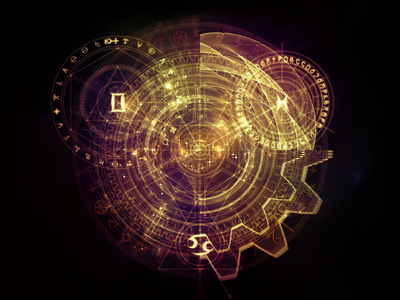
How does magick work? Is it the case that human beings have an occult or hidden aspect of themselves which, when directed in a certain way, is able to directly influence external reality to a greater or lesser extent? Or is it more accurate to say that magick works by changing the inner reality of the magickian, and that the actions then taken by the magickal practitioner bring about desired conditions according to the scientifically established laws of cause and effect?
The question of whether magick gets results via metaphysical or mundane means is one that has vexed occult philosophers for generations, so a definitive answer cannot be given here. What will be given, however, is a workable answer that will please both occultists and materialists in equal measure. That answer is simple: magick works however you expect it to work.
>> Explore Magick at Amazon <<
Intention is the driving force behind all types of magickal practice, and intention is itself nothing more than the will of an individual being directed towards a certain outcome in a sustained and consistent manner. There are thousands of magickal techniques in use around the world, and all of them are nothing more than tools by which an individual can direct his or her latent willpower to bring about change to a specified situation and improve conditions in life.
Since intention is no more mysterious than directed power of will, both occultists and materialists will be happy with the explanation given thus far. The efficacy of magick is not in dispute here either – millions of people have changed their lives with some kind of magick – so the only matter under scrutiny is that of how such results come about.
Expectation plays a big role in the working of magick, so it stands to reason that both occultists and materialists could be right in their view. An individual who adheres to an occult perspective, and believes that he is able to direct his or other non-physical energies to directly influence reality, will often experience results that corroborate that position. Events will occur, often without any intervention from the magickian, that change circumstances in his favour, and the occultist will therefore take such events as proof that he is bringing about change via metaphysical means. Even if the occultist exerts some kind of physical effort to help bring about a desired result, his faith in the metaphysical will tend to convince him that his thoughts played a much more important role in his success than his actions.
In a similar way, materialists, who maintain that magick works via the simple physical law of cause and effect, will just as often experience that to be the case. Events will occur that the materialist can attribute to his own influence at an earlier stage, and he will take those events as proof that everything he experiences can be explained according to Newtonian physics. Even if a complete and wildly unlikely coincidence were to throw success directly into the path of the materialist, without him having exerted any effort whatsoever to bring about that event, he would merely appreciate the handy coincidence that worked in his favour and completely reject any notion that it came as the result of any kind of metaphysical influence.
Clearly, experience can be used to ‘prove’ the position of both the occultist and the materialist, so any explanation of how magick works must take this into account. A suitably ambiguous explanation might therefore be as follows: ‘Magick works by helping the individual to direct his or her intention to bring about desired results in a way that makes sense according to his or her own belief system.’
Viewed in this manner, the expectation of how magick is able to get results is itself a magickal expectation that could affect those results. The wise practitioner is therefore willing to leave further questions of ‘how’ and ‘why’ to philosophers in order to proceed with a non-dualistic perspective that allows success to be achieved in any and every way possible, logical or otherwise.

